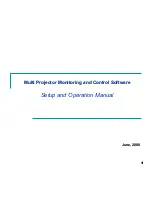
get
ting
st
ar
ted
wel
c
ome
r
t
er
in
orma
tion
2
t
e
mana
ger
t
e
c
onnect
or
DEVICES
HOSTS
USERS
PC
PC
PC
PC
PC
PC
PC
PC
PC
KVM-over-IP
evice
d
KVM-over-IP
evice
d
KVM-over-IP
evice
d
LAN / WAN
Connection
Welcome
Introduction
Adder KVM-over-IP devices provide the ability to control large numbers of host
computers from remote locations. When controlling larger groups of dispersed
computers using numerous KVM-over-IP devices, the major challenge becomes
one of
management
– retaining active control over a complex mix of devices,
host computers and registered users.
ADDER.NET has been developed as a common interface to help you to remotely
manage any number of KVM-over-IP devices together with all of their connected
host computers and the access rights of the users.
Security
To ensure maximum security, ADDER.NET does not retain any passwords within
its database for the KVM-over-IP devices that it controls. Instead, a valid password
is used once only to gain access to each device during the ‘acquire’ stage where
ADDER.NET establishes a
Secure Ticket
with the device. In all subsequent
accesses to each device, the relevant secure ticket is used to gain access.
Remote ADDER.NET server
Managing the details and relationships between multiple
KVM-over-IP devices, host computers and registered users
SECT 1
A brief glossary of terms
Throughout the ADDER.NET application and also this guide, you will find the
following terms used to describe the constituent parts of a typical KVM-over-IP
system:
Device
- Any KVM-over-IP apparatus that allows remote access to one or more
computer systems (hosts).
Device cluster
- KVM-over-IP devices can be grouped together to provide
multiple redundant connections to computer systems - such groups of devices
are called
Clusters
. Users are able to connect to the first available device in a
cluster rather than a specific device.
Host
- A computer system that is accessible remotely via a KVM-over-IP device. If
a KVM-over-IP device serves a single host, then they are usually considered to be
the same logical entity and there is no need to separately define the host.
Host group
- A logical collection of host computers linked to the same or
different KVM devices which can be managed collectively and represented by a
single entry within ADDER.NET.
Manager
- A user of the system with certain special privileges, in particular the
ability to manage the database associated with ADDER.NET.
Power control device (PCD)
- A power switch (usually with multiple outlets)
that can control the mains supply being fed to computer hosts or KVM devices,
under the command of a remote user via a network connection.
Target
- A target is anything that a user can make a connection to and that
can have user rights allocated to it. A target may be a device, a host or a device
cluster.
User
- A registered user of the system who has a defined access rights profile.
User group
- A logical collection of users who require the same access rights to
devices and hosts within the system. They can be represented by a single entry
within ADDER.NET and managed collectively.




































